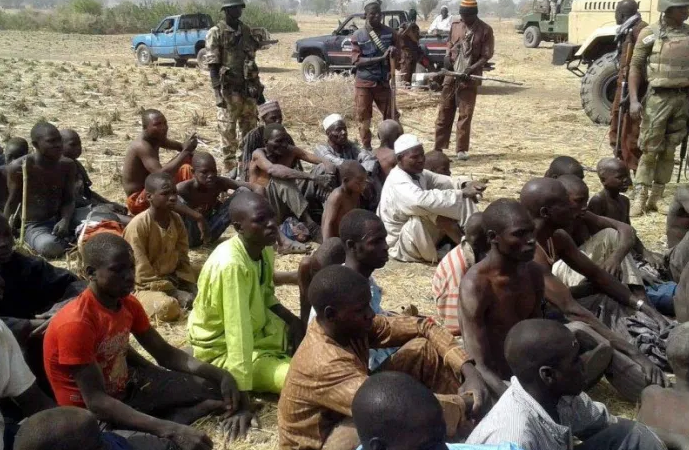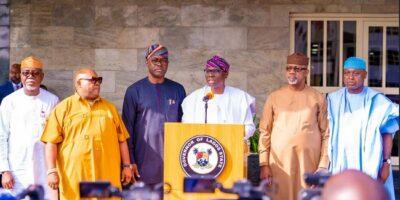Nigerian Military: 1,000 Terrorists Prosecuted, 500 Jailed

- Indicates more to go on trial June
The military yesterday put the number of Boko Haram terrorists who have been prosecuted at 1,000 while 500 have been jailed.
In addition, more members of the terror group are to go on trial in June.
The decision to put the insurgents on trial came as the federal government affirmed its determination to secure the country against threats to its corporate existence.
It also expressed the readiness of the military to execute the presidential directive to the armed forces and other security agencies to end all threats to national territorial integrity, including banditry, terrorism and kidnapping.
The United Nations (UN), European Union (EU), the United Kingdom (UK) and the Centre for Humanitarian Dialogue have also met in Abuja to chart a new course to contain the humanitarian crisis in the North-east, where over eight million people have been displaced.
The Chief of Defence Staff, Gen. Lucky Irabor, said at a meeting tagged: “The North-east Symposium on Reintegration, Reconciliation and Resettlement,” that 1,000 insurgents had been prosecuted since the inception of Operation Safe Corridor (OPSC), saddled with the responsibility of deradicalising repentant insurgents, while 500 were jailed for five to 60 years.
Irabor, who was represented by the OPSC Commander, Maj. Gen. Bamidele Ashafa, said:
The federal government of Nigeria does not condone Boko Haram. Over 1,000 Boko Haram members have been prosecuted. I want to use this opportunity to say that over 500 have been jailed and are serving various jail terms for up to 60 years, the minimum term is five years.
Arrangements are also being concluded to begin the trial of another set of Boko Haram suspects. That will start between now and June.
In her remarks, the Country Director, Centre for Humanitarian Dialogue, Ms. Millicent Ojomo, said the two-day event was a continuation of its policy dialogue to ensure that the objectives of ensuring rehabilitation, reconciliation and resettlement were realised.
She called for synergy on the part of all stakeholders to make the summit a reality.
In his goodwill message, Deputy Head of Mission and Team Leader, Economic Cooperation and Energy, Alexandre Borges-Gomez, harped on the need for stakeholders to go beyond humanitarian challenges and evolve an integrated approach and a sustainable strategy.
The British High Commissioner to Nigeria, Catriona Wendy Laing, said the UK was worried about the Boko Haram insurgency and the concomitant humanitarian crisis that has to be confronted.
She said there was the need for governors of the North-east and the heads of state of the Lake Chad Basin to work in synergy to enable communities to recover their livelihoods.
Meanwhile, at a national defence and security summit in Abuja, Minister of Defence, Major General Bashir Magashi (rtd), expressed the determination of the Federal Government to end security challenges in the country.
The Federal Government’s first line charge priority of ensuring the safety of lives and property of the citizenry is sacrosanct. There is no going back on this national aspiration.
He stated that the presidential directive to the armed forces and other security agencies
was clear on the need to decisively end all forces of threats to the the national territorial integrity including banditry, terrorism and kidnapping.
The minister, therefore, described the summit themed: “Kinetic Operations, a Major Plank for Counter-Terrorism and Counter-Insurgency in Nigeria: Issues, Challenges and Prospects,” as timely.
He called for concerted efforts to support the current efforts to promote peace and stability, while identifying various security instruments emplaced by the federal government to address internal security challenges, which include Operation Lafiya Dole, Operation Safe Haven and strategic empowerment of the Multinational Joint Task Force (MNJTF) as well as intervention mechanism such as North-east development.
Also at the event, Irabor said the military would enhance its kinetic operations in dealing with the prevailing security challenges confronting the nation.
Irabor said the one-day summit would discuss the promotion of kinetic operations by leaders and eminent personalities in Nigeria.
Our strategic objectives are manifold and imbued to neutralise non-state-actors and other agents of violence in our communities, forests and countryside to stabilise the security situation across the nation to facilitate law and order and lastly to provide the enabling environment for peace and development.
These presuppose that the military would need support from other security agencies during the operations and would be required to give support to others at different stages of the internal security effort,
he added.

Justin Nwosu is the founder and publisher of Flavision. His core interest is in writing unbiased news about Nigeria in particular and Africa in general. He’s a strong adherent of investigative journalism, with a bent on exposing corruption, abuse of power and societal ills.













